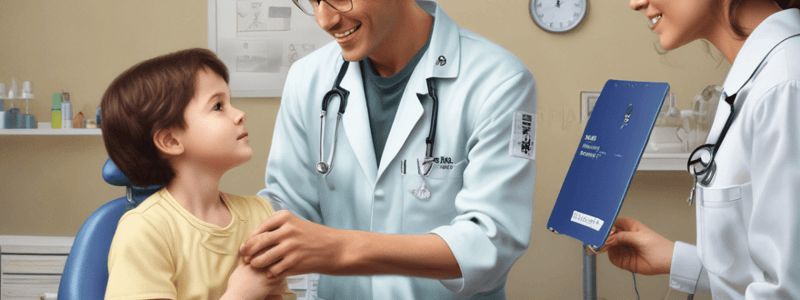Podcast
Questions and Answers
At what age do children start understanding the significance of events and can begin to accurately answer related questions?
At what age do children start understanding the significance of events and can begin to accurately answer related questions?
- 5 years
- 6 years (correct)
- 7 years
- 3 years
What difficulty do children between 3 and 7 years old often face?
What difficulty do children between 3 and 7 years old often face?
- Estimating the time that has passed since an event (correct)
- Accurately recounting events
- Differentiating truth from falsehood
- Understanding complex questions
Why might sensory aids be used in a court of law when a child is giving a testimony?
Why might sensory aids be used in a court of law when a child is giving a testimony?
- To measure the child's truthful responses
- To support the child emotionally
- To evaluate the child's cognitive development
- To help the child recall memories (correct)
What should be included in a court report about a child?
What should be included in a court report about a child?
Which group of professionals is most likely to refer children with emotional, interpersonal, and conduct disorders to a child psychiatrist?
Which group of professionals is most likely to refer children with emotional, interpersonal, and conduct disorders to a child psychiatrist?
What is a common challenge faced by children under 6 years of age?
What is a common challenge faced by children under 6 years of age?
Why is it important to listen carefully during a child's description of an event?
Why is it important to listen carefully during a child's description of an event?
What factor may affect the reliability of children's frightening memories in a courtroom?
What factor may affect the reliability of children's frightening memories in a courtroom?
What should you do when interviewing a child who is a possible victim?
What should you do when interviewing a child who is a possible victim?
What is important when a child psychiatrist is preparing a court report?
What is important when a child psychiatrist is preparing a court report?
What aspect is often emphasized during a basic physical examination of a child?
What aspect is often emphasized during a basic physical examination of a child?
What should be considered when observing a child's behavior during a physical examination?
What should be considered when observing a child's behavior during a physical examination?
Who might be needed if a significant neurological problem is suspected in a child?
Who might be needed if a significant neurological problem is suspected in a child?
When should a child be examined by the general practitioner?
When should a child be examined by the general practitioner?
What is the role of the psychiatrist at the end of the assessment?
What is the role of the psychiatrist at the end of the assessment?
Flashcards are hidden until you start studying
Study Notes
Physical Examination
- A physical examination is conducted to complete the assessment, depending on the problem's nature and potential impact on the child's appearance.
- Observing the child's behavior during play is essential to gather evidence of signs.
- A basic physical examination may include an emphasis on the nervous system.
- If a significant neurological problem is suspected, a pediatrician or pediatric neurologist may be needed.
Assessing Children's Accounts of Events
- Interviewers should be aware of the child's limitations when discussing events, such as difficulty estimating time and remembering past events.
- Children between 3-7 years old have trouble with time and cognitive skills.
- Children under 6 years old may struggle to accurately remember past events and may need help to describe them.
- Children around 6 years old can understand the significance of an event and accurately answer questions.
- However, they may still have difficulty with accurate accounts of timing due to their ongoing development.
- In a court of law, sensory aids can be used to activate memories.
- Complex questions can confuse children under 6 years old.
Court Report About a Child
- A court report should include:
- The qualifications of the writer and their training
- A summary of the findings from the interview with the child
- Relevant information from social enquiry reports
- The author's evaluation of the importance of the findings
- The strength and weaknesses of contextual factors
- Thorough explanations of evidence used from the child, family, and wider environment
Psychiatric Treatment for Children and Their Families
- Treatment for children involves addressing general features, as well as specific disorders.
- Developmental difficulties, psychological complications of physical illness, and emotional, interpersonal, and conduct disorders are common reasons for referral to a child psychiatrist.
- The primary care team plays a crucial role in identifying children who need referral to a psychiatrist or pediatrician.
The Role of the Primary Care Team
- General practitioners and other primary care team members often encounter children with concerns about their behavior, but only refer a small proportion to a psychiatrist or pediatrician.
- General practitioners are more likely to refer children with presenting problems, such as emotional or interpersonal issues.
The Psychiatric Team
- The psychiatric team involves a range of professionals, including psychiatrists, psychologists, family therapists, and nurses.
- They work together to provide comprehensive support for children and their families.
Studying That Suits You
Use AI to generate personalized quizzes and flashcards to suit your learning preferences.




